Otago Polytechnic: Occupational Therapy Special Assessment Project
VerifiedAdded on 2023/06/04
|9
|2242
|169
Project
AI Summary
This assignment delves into the core principles and practices of occupational therapy, exploring the role of occupational therapists in assisting individuals facing physical or mental challenges. It examines the systematic assessment process used to design interventions for activities of daily living, emphasizing the importance of occupations in promoting holistic well-being. The assignment covers various aspects, including the evolution of occupational therapy philosophy, practice frameworks like the Occupational Therapy Practice Framework (OTPF) and the Canadian Model of Client-Centered Enablement (CMCE), and the integration of cultural considerations, particularly within the Maori community, incorporating concepts like Tikanga. The student presents an analysis of the OTPF framework, its domains, and processes, along with potential areas for improvement. The assignment also explores methods of delivering occupational therapy to the indigenous population of Maori, including ways to incorporate cultural sensitivity and promote community engagement. The references include scholarly articles and guidelines from the American Occupational Therapy Association.
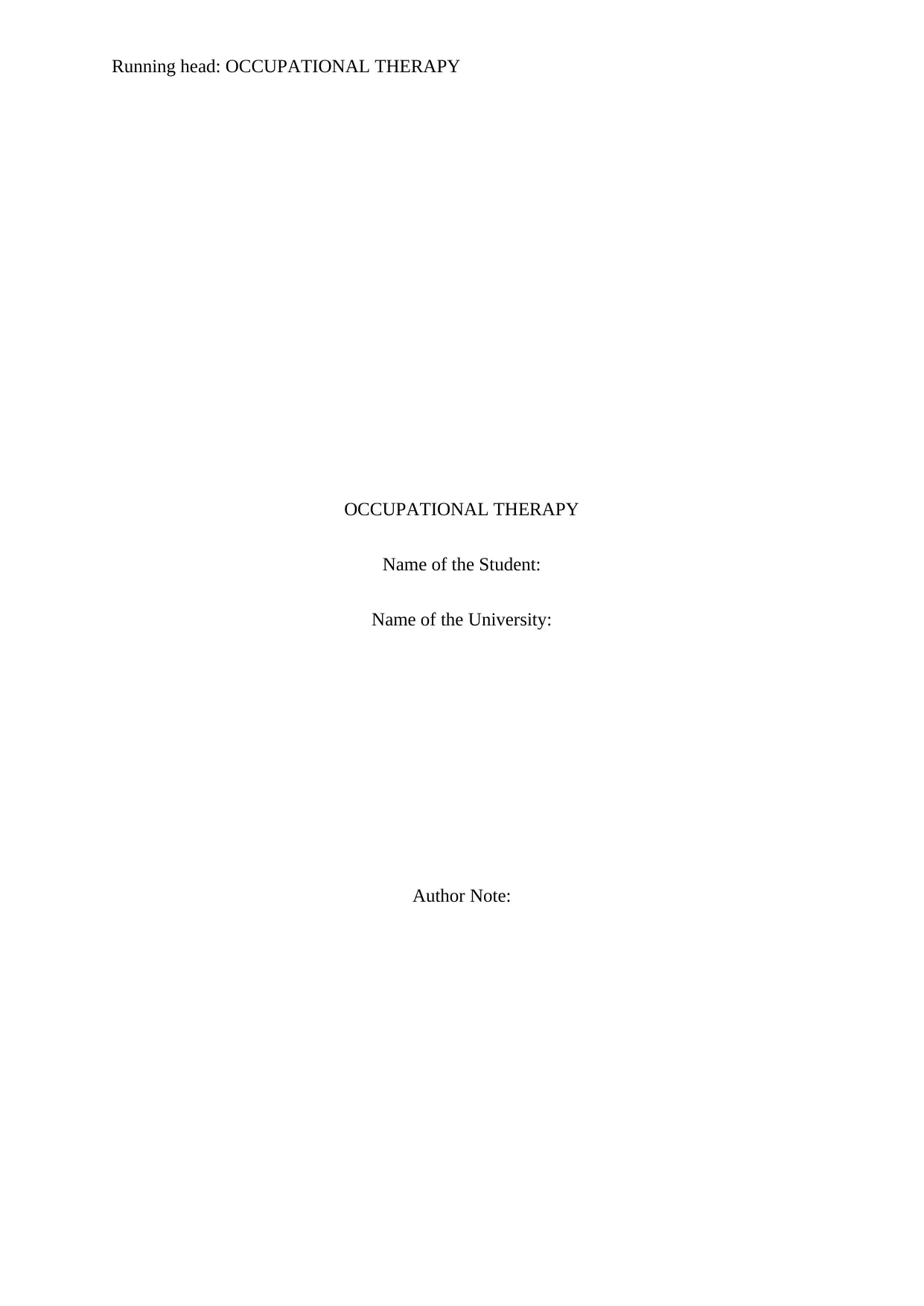
Running head: OCCUPATIONAL THERAPY
OCCUPATIONAL THERAPY
Name of the Student:
Name of the University:
Author Note:
OCCUPATIONAL THERAPY
Name of the Student:
Name of the University:
Author Note:
Paraphrase This Document
Need a fresh take? Get an instant paraphrase of this document with our AI Paraphraser
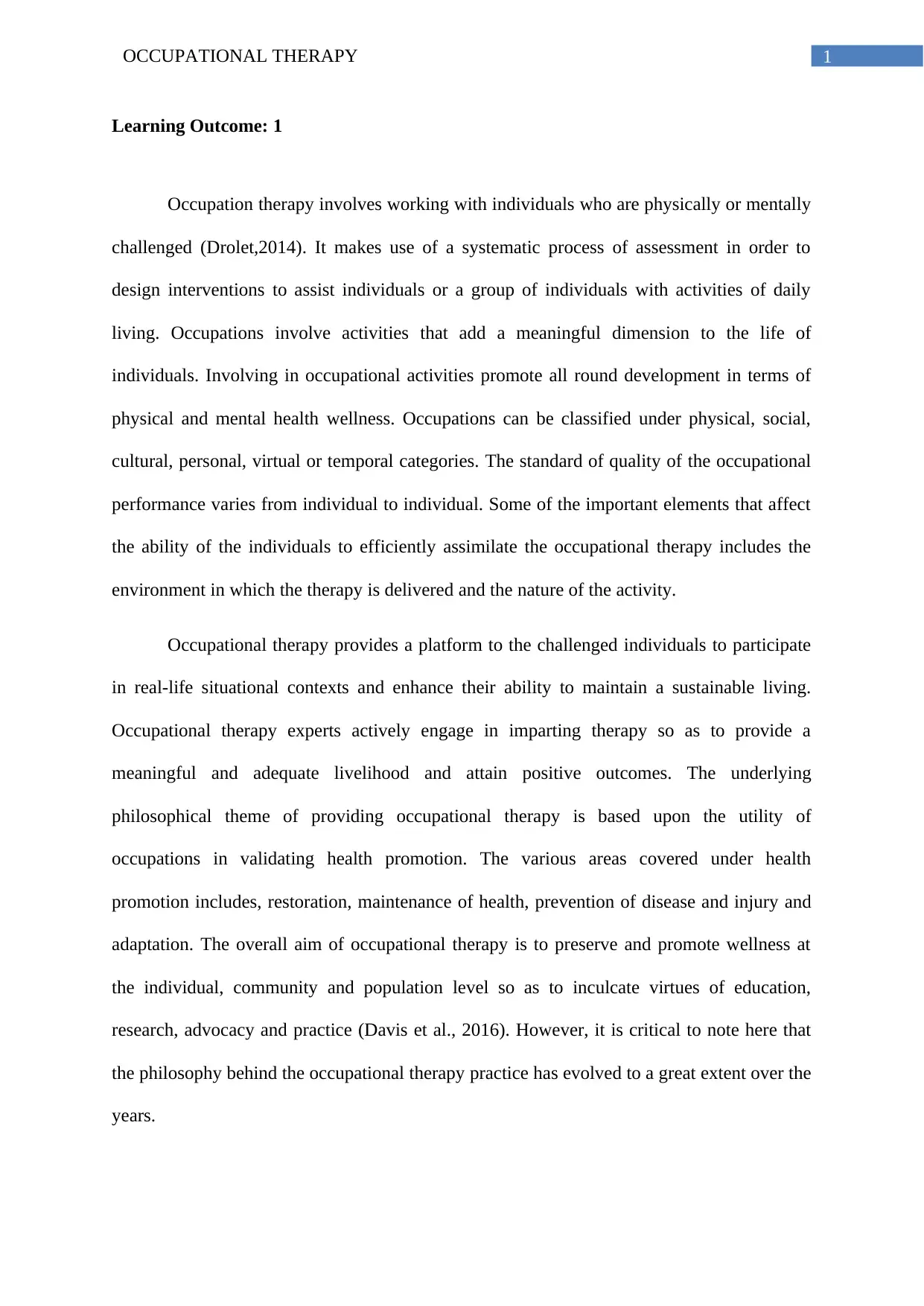
1OCCUPATIONAL THERAPY
Learning Outcome: 1
Occupation therapy involves working with individuals who are physically or mentally
challenged (Drolet,2014). It makes use of a systematic process of assessment in order to
design interventions to assist individuals or a group of individuals with activities of daily
living. Occupations involve activities that add a meaningful dimension to the life of
individuals. Involving in occupational activities promote all round development in terms of
physical and mental health wellness. Occupations can be classified under physical, social,
cultural, personal, virtual or temporal categories. The standard of quality of the occupational
performance varies from individual to individual. Some of the important elements that affect
the ability of the individuals to efficiently assimilate the occupational therapy includes the
environment in which the therapy is delivered and the nature of the activity.
Occupational therapy provides a platform to the challenged individuals to participate
in real-life situational contexts and enhance their ability to maintain a sustainable living.
Occupational therapy experts actively engage in imparting therapy so as to provide a
meaningful and adequate livelihood and attain positive outcomes. The underlying
philosophical theme of providing occupational therapy is based upon the utility of
occupations in validating health promotion. The various areas covered under health
promotion includes, restoration, maintenance of health, prevention of disease and injury and
adaptation. The overall aim of occupational therapy is to preserve and promote wellness at
the individual, community and population level so as to inculcate virtues of education,
research, advocacy and practice (Davis et al., 2016). However, it is critical to note here that
the philosophy behind the occupational therapy practice has evolved to a great extent over the
years.
Learning Outcome: 1
Occupation therapy involves working with individuals who are physically or mentally
challenged (Drolet,2014). It makes use of a systematic process of assessment in order to
design interventions to assist individuals or a group of individuals with activities of daily
living. Occupations involve activities that add a meaningful dimension to the life of
individuals. Involving in occupational activities promote all round development in terms of
physical and mental health wellness. Occupations can be classified under physical, social,
cultural, personal, virtual or temporal categories. The standard of quality of the occupational
performance varies from individual to individual. Some of the important elements that affect
the ability of the individuals to efficiently assimilate the occupational therapy includes the
environment in which the therapy is delivered and the nature of the activity.
Occupational therapy provides a platform to the challenged individuals to participate
in real-life situational contexts and enhance their ability to maintain a sustainable living.
Occupational therapy experts actively engage in imparting therapy so as to provide a
meaningful and adequate livelihood and attain positive outcomes. The underlying
philosophical theme of providing occupational therapy is based upon the utility of
occupations in validating health promotion. The various areas covered under health
promotion includes, restoration, maintenance of health, prevention of disease and injury and
adaptation. The overall aim of occupational therapy is to preserve and promote wellness at
the individual, community and population level so as to inculcate virtues of education,
research, advocacy and practice (Davis et al., 2016). However, it is critical to note here that
the philosophy behind the occupational therapy practice has evolved to a great extent over the
years.
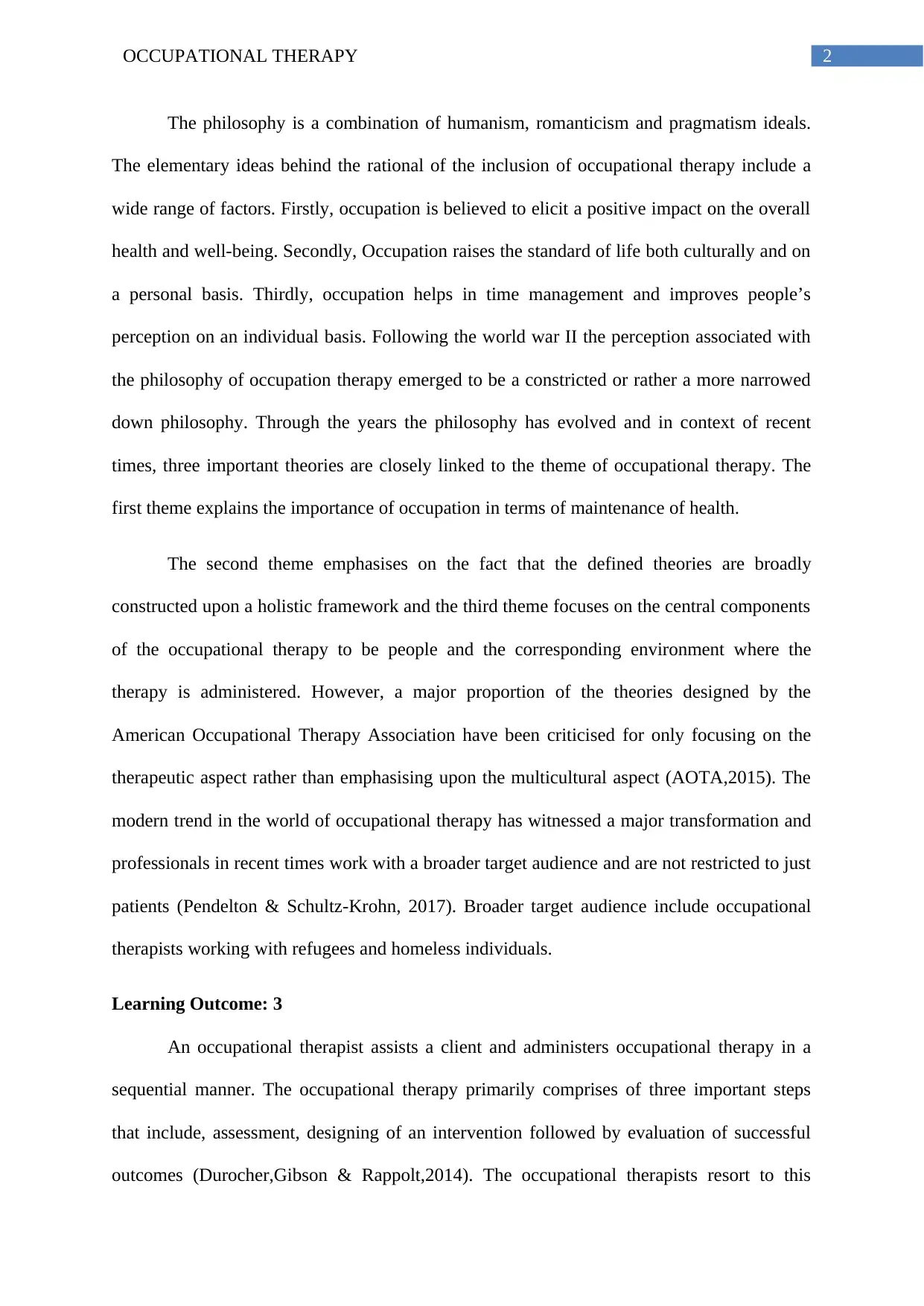
2OCCUPATIONAL THERAPY
The philosophy is a combination of humanism, romanticism and pragmatism ideals.
The elementary ideas behind the rational of the inclusion of occupational therapy include a
wide range of factors. Firstly, occupation is believed to elicit a positive impact on the overall
health and well-being. Secondly, Occupation raises the standard of life both culturally and on
a personal basis. Thirdly, occupation helps in time management and improves people’s
perception on an individual basis. Following the world war II the perception associated with
the philosophy of occupation therapy emerged to be a constricted or rather a more narrowed
down philosophy. Through the years the philosophy has evolved and in context of recent
times, three important theories are closely linked to the theme of occupational therapy. The
first theme explains the importance of occupation in terms of maintenance of health.
The second theme emphasises on the fact that the defined theories are broadly
constructed upon a holistic framework and the third theme focuses on the central components
of the occupational therapy to be people and the corresponding environment where the
therapy is administered. However, a major proportion of the theories designed by the
American Occupational Therapy Association have been criticised for only focusing on the
therapeutic aspect rather than emphasising upon the multicultural aspect (AOTA,2015). The
modern trend in the world of occupational therapy has witnessed a major transformation and
professionals in recent times work with a broader target audience and are not restricted to just
patients (Pendelton & Schultz-Krohn, 2017). Broader target audience include occupational
therapists working with refugees and homeless individuals.
Learning Outcome: 3
An occupational therapist assists a client and administers occupational therapy in a
sequential manner. The occupational therapy primarily comprises of three important steps
that include, assessment, designing of an intervention followed by evaluation of successful
outcomes (Durocher,Gibson & Rappolt,2014). The occupational therapists resort to this
The philosophy is a combination of humanism, romanticism and pragmatism ideals.
The elementary ideas behind the rational of the inclusion of occupational therapy include a
wide range of factors. Firstly, occupation is believed to elicit a positive impact on the overall
health and well-being. Secondly, Occupation raises the standard of life both culturally and on
a personal basis. Thirdly, occupation helps in time management and improves people’s
perception on an individual basis. Following the world war II the perception associated with
the philosophy of occupation therapy emerged to be a constricted or rather a more narrowed
down philosophy. Through the years the philosophy has evolved and in context of recent
times, three important theories are closely linked to the theme of occupational therapy. The
first theme explains the importance of occupation in terms of maintenance of health.
The second theme emphasises on the fact that the defined theories are broadly
constructed upon a holistic framework and the third theme focuses on the central components
of the occupational therapy to be people and the corresponding environment where the
therapy is administered. However, a major proportion of the theories designed by the
American Occupational Therapy Association have been criticised for only focusing on the
therapeutic aspect rather than emphasising upon the multicultural aspect (AOTA,2015). The
modern trend in the world of occupational therapy has witnessed a major transformation and
professionals in recent times work with a broader target audience and are not restricted to just
patients (Pendelton & Schultz-Krohn, 2017). Broader target audience include occupational
therapists working with refugees and homeless individuals.
Learning Outcome: 3
An occupational therapist assists a client and administers occupational therapy in a
sequential manner. The occupational therapy primarily comprises of three important steps
that include, assessment, designing of an intervention followed by evaluation of successful
outcomes (Durocher,Gibson & Rappolt,2014). The occupational therapists resort to this
⊘ This is a preview!⊘
Do you want full access?
Subscribe today to unlock all pages.

Trusted by 1+ million students worldwide
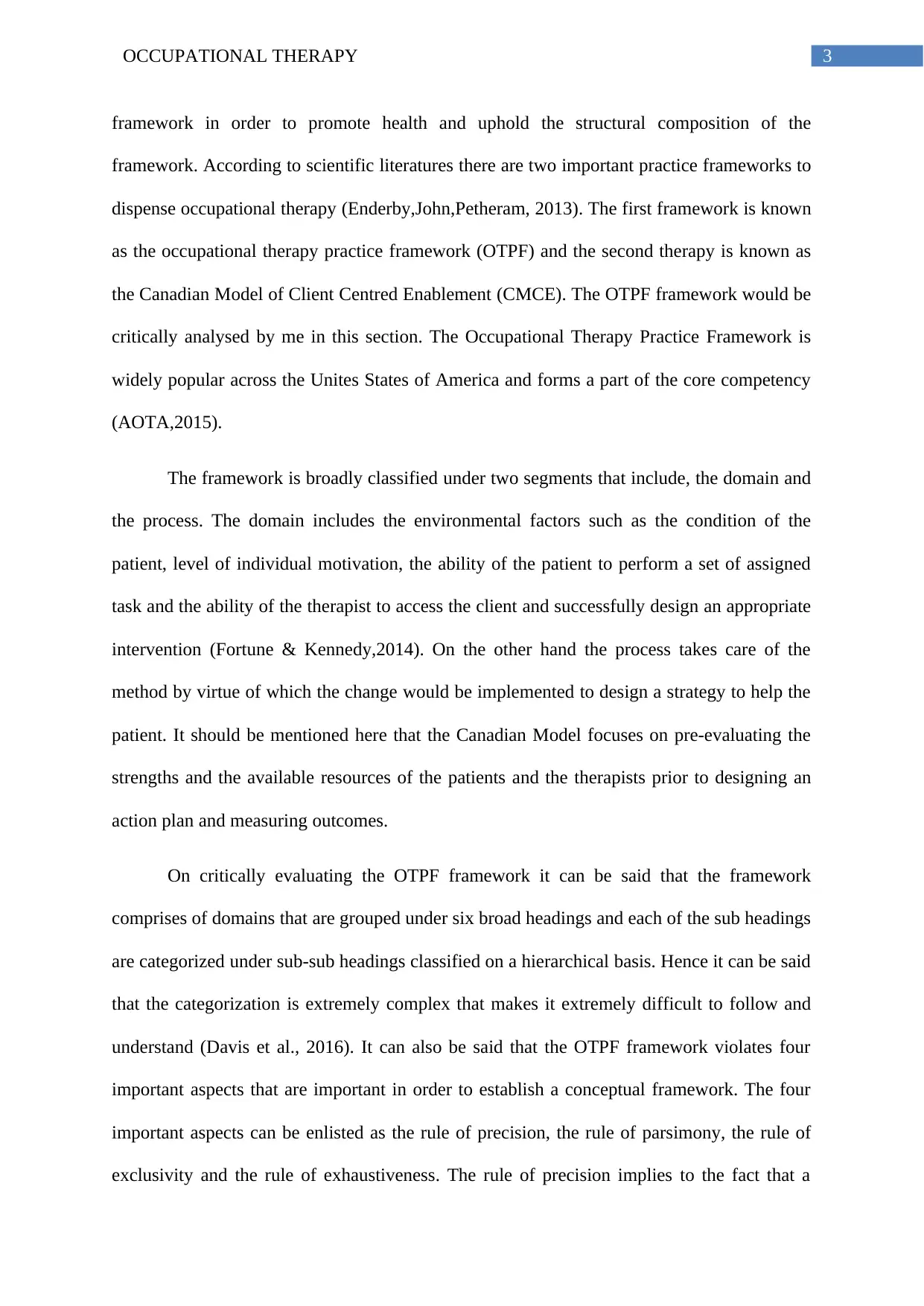
3OCCUPATIONAL THERAPY
framework in order to promote health and uphold the structural composition of the
framework. According to scientific literatures there are two important practice frameworks to
dispense occupational therapy (Enderby,John,Petheram, 2013). The first framework is known
as the occupational therapy practice framework (OTPF) and the second therapy is known as
the Canadian Model of Client Centred Enablement (CMCE). The OTPF framework would be
critically analysed by me in this section. The Occupational Therapy Practice Framework is
widely popular across the Unites States of America and forms a part of the core competency
(AOTA,2015).
The framework is broadly classified under two segments that include, the domain and
the process. The domain includes the environmental factors such as the condition of the
patient, level of individual motivation, the ability of the patient to perform a set of assigned
task and the ability of the therapist to access the client and successfully design an appropriate
intervention (Fortune & Kennedy,2014). On the other hand the process takes care of the
method by virtue of which the change would be implemented to design a strategy to help the
patient. It should be mentioned here that the Canadian Model focuses on pre-evaluating the
strengths and the available resources of the patients and the therapists prior to designing an
action plan and measuring outcomes.
On critically evaluating the OTPF framework it can be said that the framework
comprises of domains that are grouped under six broad headings and each of the sub headings
are categorized under sub-sub headings classified on a hierarchical basis. Hence it can be said
that the categorization is extremely complex that makes it extremely difficult to follow and
understand (Davis et al., 2016). It can also be said that the OTPF framework violates four
important aspects that are important in order to establish a conceptual framework. The four
important aspects can be enlisted as the rule of precision, the rule of parsimony, the rule of
exclusivity and the rule of exhaustiveness. The rule of precision implies to the fact that a
framework in order to promote health and uphold the structural composition of the
framework. According to scientific literatures there are two important practice frameworks to
dispense occupational therapy (Enderby,John,Petheram, 2013). The first framework is known
as the occupational therapy practice framework (OTPF) and the second therapy is known as
the Canadian Model of Client Centred Enablement (CMCE). The OTPF framework would be
critically analysed by me in this section. The Occupational Therapy Practice Framework is
widely popular across the Unites States of America and forms a part of the core competency
(AOTA,2015).
The framework is broadly classified under two segments that include, the domain and
the process. The domain includes the environmental factors such as the condition of the
patient, level of individual motivation, the ability of the patient to perform a set of assigned
task and the ability of the therapist to access the client and successfully design an appropriate
intervention (Fortune & Kennedy,2014). On the other hand the process takes care of the
method by virtue of which the change would be implemented to design a strategy to help the
patient. It should be mentioned here that the Canadian Model focuses on pre-evaluating the
strengths and the available resources of the patients and the therapists prior to designing an
action plan and measuring outcomes.
On critically evaluating the OTPF framework it can be said that the framework
comprises of domains that are grouped under six broad headings and each of the sub headings
are categorized under sub-sub headings classified on a hierarchical basis. Hence it can be said
that the categorization is extremely complex that makes it extremely difficult to follow and
understand (Davis et al., 2016). It can also be said that the OTPF framework violates four
important aspects that are important in order to establish a conceptual framework. The four
important aspects can be enlisted as the rule of precision, the rule of parsimony, the rule of
exclusivity and the rule of exhaustiveness. The rule of precision implies to the fact that a
Paraphrase This Document
Need a fresh take? Get an instant paraphrase of this document with our AI Paraphraser
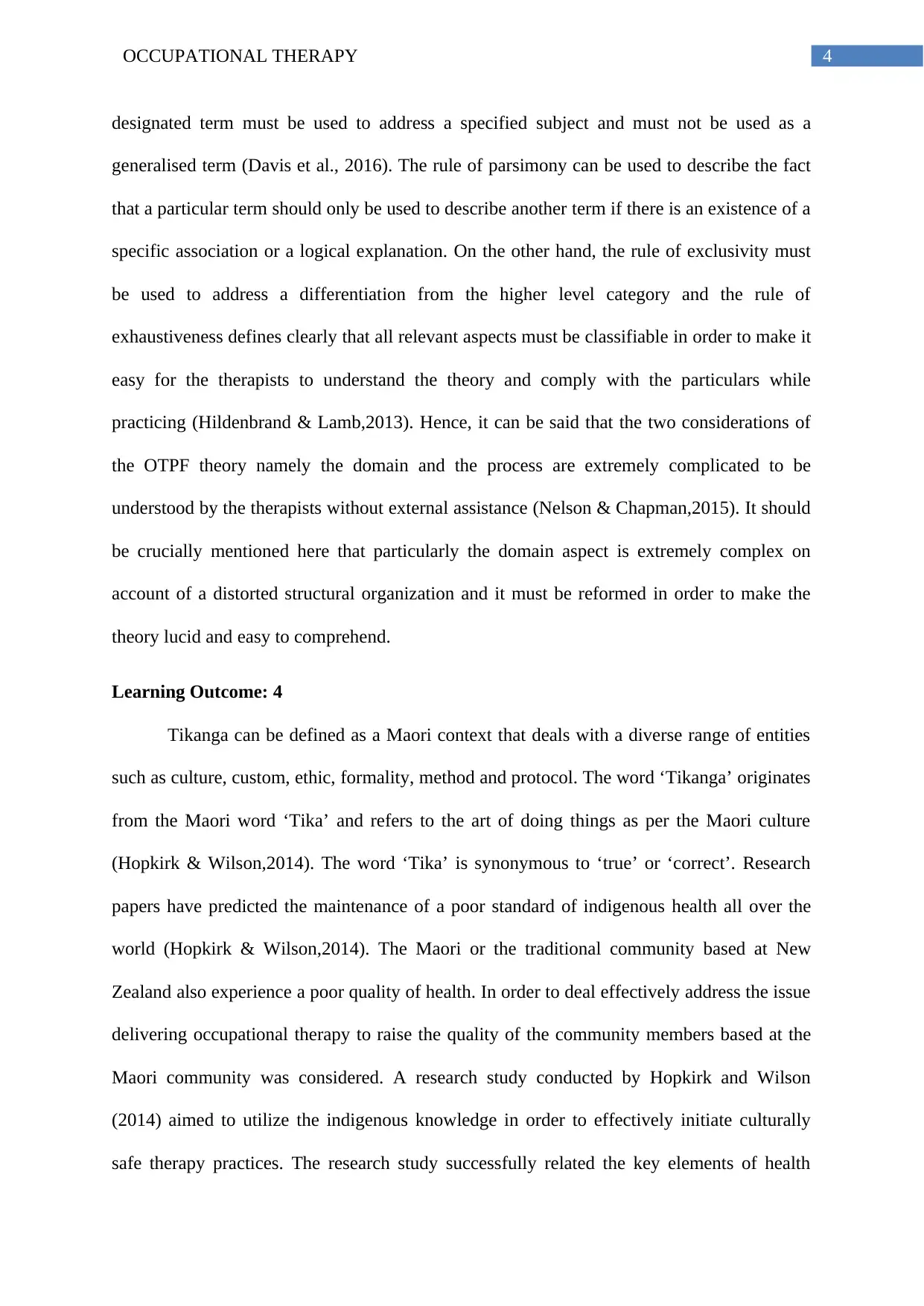
4OCCUPATIONAL THERAPY
designated term must be used to address a specified subject and must not be used as a
generalised term (Davis et al., 2016). The rule of parsimony can be used to describe the fact
that a particular term should only be used to describe another term if there is an existence of a
specific association or a logical explanation. On the other hand, the rule of exclusivity must
be used to address a differentiation from the higher level category and the rule of
exhaustiveness defines clearly that all relevant aspects must be classifiable in order to make it
easy for the therapists to understand the theory and comply with the particulars while
practicing (Hildenbrand & Lamb,2013). Hence, it can be said that the two considerations of
the OTPF theory namely the domain and the process are extremely complicated to be
understood by the therapists without external assistance (Nelson & Chapman,2015). It should
be crucially mentioned here that particularly the domain aspect is extremely complex on
account of a distorted structural organization and it must be reformed in order to make the
theory lucid and easy to comprehend.
Learning Outcome: 4
Tikanga can be defined as a Maori context that deals with a diverse range of entities
such as culture, custom, ethic, formality, method and protocol. The word ‘Tikanga’ originates
from the Maori word ‘Tika’ and refers to the art of doing things as per the Maori culture
(Hopkirk & Wilson,2014). The word ‘Tika’ is synonymous to ‘true’ or ‘correct’. Research
papers have predicted the maintenance of a poor standard of indigenous health all over the
world (Hopkirk & Wilson,2014). The Maori or the traditional community based at New
Zealand also experience a poor quality of health. In order to deal effectively address the issue
delivering occupational therapy to raise the quality of the community members based at the
Maori community was considered. A research study conducted by Hopkirk and Wilson
(2014) aimed to utilize the indigenous knowledge in order to effectively initiate culturally
safe therapy practices. The research study successfully related the key elements of health
designated term must be used to address a specified subject and must not be used as a
generalised term (Davis et al., 2016). The rule of parsimony can be used to describe the fact
that a particular term should only be used to describe another term if there is an existence of a
specific association or a logical explanation. On the other hand, the rule of exclusivity must
be used to address a differentiation from the higher level category and the rule of
exhaustiveness defines clearly that all relevant aspects must be classifiable in order to make it
easy for the therapists to understand the theory and comply with the particulars while
practicing (Hildenbrand & Lamb,2013). Hence, it can be said that the two considerations of
the OTPF theory namely the domain and the process are extremely complicated to be
understood by the therapists without external assistance (Nelson & Chapman,2015). It should
be crucially mentioned here that particularly the domain aspect is extremely complex on
account of a distorted structural organization and it must be reformed in order to make the
theory lucid and easy to comprehend.
Learning Outcome: 4
Tikanga can be defined as a Maori context that deals with a diverse range of entities
such as culture, custom, ethic, formality, method and protocol. The word ‘Tikanga’ originates
from the Maori word ‘Tika’ and refers to the art of doing things as per the Maori culture
(Hopkirk & Wilson,2014). The word ‘Tika’ is synonymous to ‘true’ or ‘correct’. Research
papers have predicted the maintenance of a poor standard of indigenous health all over the
world (Hopkirk & Wilson,2014). The Maori or the traditional community based at New
Zealand also experience a poor quality of health. In order to deal effectively address the issue
delivering occupational therapy to raise the quality of the community members based at the
Maori community was considered. A research study conducted by Hopkirk and Wilson
(2014) aimed to utilize the indigenous knowledge in order to effectively initiate culturally
safe therapy practices. The research study successfully related the key elements of health
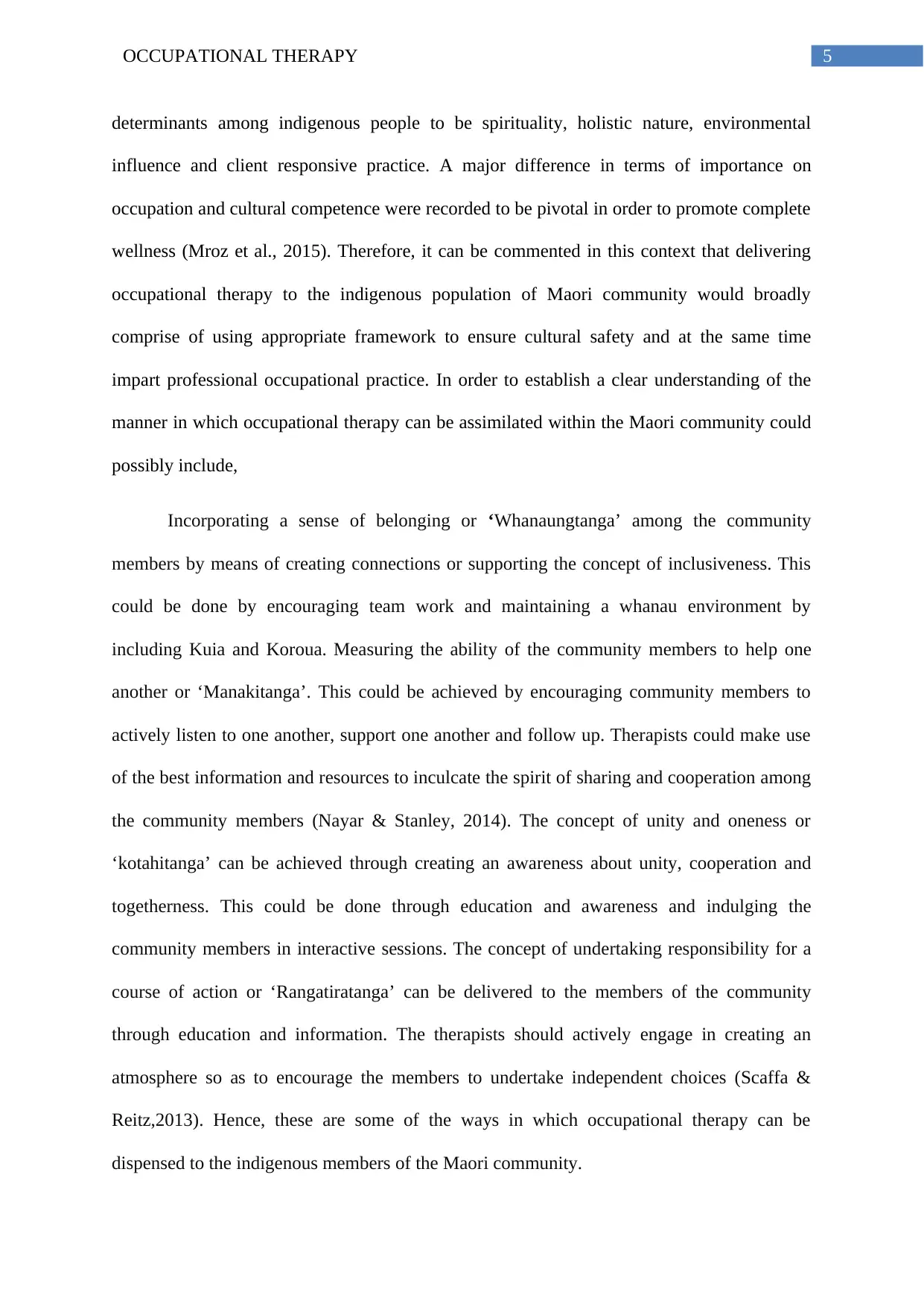
5OCCUPATIONAL THERAPY
determinants among indigenous people to be spirituality, holistic nature, environmental
influence and client responsive practice. A major difference in terms of importance on
occupation and cultural competence were recorded to be pivotal in order to promote complete
wellness (Mroz et al., 2015). Therefore, it can be commented in this context that delivering
occupational therapy to the indigenous population of Maori community would broadly
comprise of using appropriate framework to ensure cultural safety and at the same time
impart professional occupational practice. In order to establish a clear understanding of the
manner in which occupational therapy can be assimilated within the Maori community could
possibly include,
Incorporating a sense of belonging or ‘Whanaungtanga’ among the community
members by means of creating connections or supporting the concept of inclusiveness. This
could be done by encouraging team work and maintaining a whanau environment by
including Kuia and Koroua. Measuring the ability of the community members to help one
another or ‘Manakitanga’. This could be achieved by encouraging community members to
actively listen to one another, support one another and follow up. Therapists could make use
of the best information and resources to inculcate the spirit of sharing and cooperation among
the community members (Nayar & Stanley, 2014). The concept of unity and oneness or
‘kotahitanga’ can be achieved through creating an awareness about unity, cooperation and
togetherness. This could be done through education and awareness and indulging the
community members in interactive sessions. The concept of undertaking responsibility for a
course of action or ‘Rangatiratanga’ can be delivered to the members of the community
through education and information. The therapists should actively engage in creating an
atmosphere so as to encourage the members to undertake independent choices (Scaffa &
Reitz,2013). Hence, these are some of the ways in which occupational therapy can be
dispensed to the indigenous members of the Maori community.
determinants among indigenous people to be spirituality, holistic nature, environmental
influence and client responsive practice. A major difference in terms of importance on
occupation and cultural competence were recorded to be pivotal in order to promote complete
wellness (Mroz et al., 2015). Therefore, it can be commented in this context that delivering
occupational therapy to the indigenous population of Maori community would broadly
comprise of using appropriate framework to ensure cultural safety and at the same time
impart professional occupational practice. In order to establish a clear understanding of the
manner in which occupational therapy can be assimilated within the Maori community could
possibly include,
Incorporating a sense of belonging or ‘Whanaungtanga’ among the community
members by means of creating connections or supporting the concept of inclusiveness. This
could be done by encouraging team work and maintaining a whanau environment by
including Kuia and Koroua. Measuring the ability of the community members to help one
another or ‘Manakitanga’. This could be achieved by encouraging community members to
actively listen to one another, support one another and follow up. Therapists could make use
of the best information and resources to inculcate the spirit of sharing and cooperation among
the community members (Nayar & Stanley, 2014). The concept of unity and oneness or
‘kotahitanga’ can be achieved through creating an awareness about unity, cooperation and
togetherness. This could be done through education and awareness and indulging the
community members in interactive sessions. The concept of undertaking responsibility for a
course of action or ‘Rangatiratanga’ can be delivered to the members of the community
through education and information. The therapists should actively engage in creating an
atmosphere so as to encourage the members to undertake independent choices (Scaffa &
Reitz,2013). Hence, these are some of the ways in which occupational therapy can be
dispensed to the indigenous members of the Maori community.
⊘ This is a preview!⊘
Do you want full access?
Subscribe today to unlock all pages.

Trusted by 1+ million students worldwide

6OCCUPATIONAL THERAPY
Paraphrase This Document
Need a fresh take? Get an instant paraphrase of this document with our AI Paraphraser
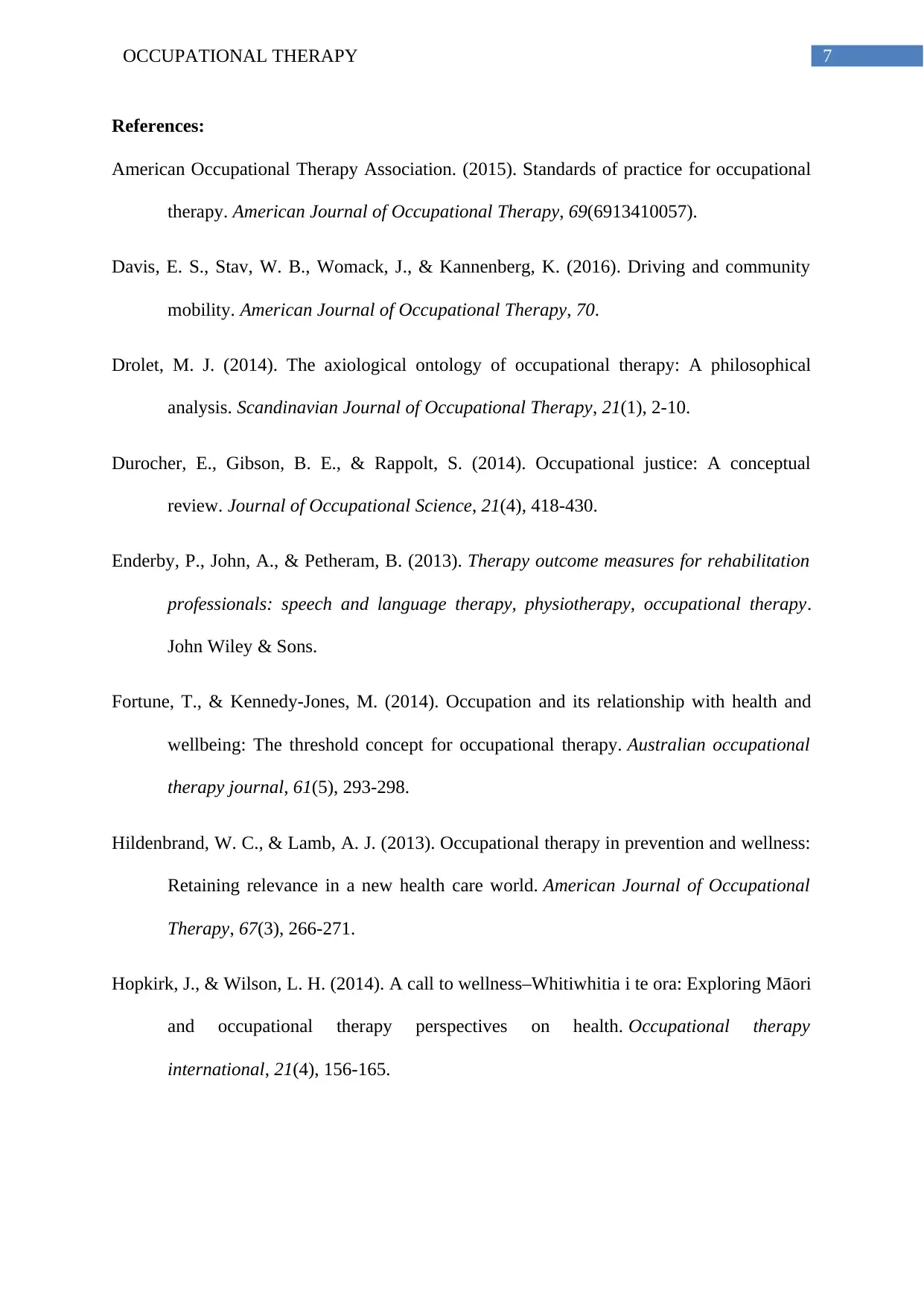
7OCCUPATIONAL THERAPY
References:
American Occupational Therapy Association. (2015). Standards of practice for occupational
therapy. American Journal of Occupational Therapy, 69(6913410057).
Davis, E. S., Stav, W. B., Womack, J., & Kannenberg, K. (2016). Driving and community
mobility. American Journal of Occupational Therapy, 70.
Drolet, M. J. (2014). The axiological ontology of occupational therapy: A philosophical
analysis. Scandinavian Journal of Occupational Therapy, 21(1), 2-10.
Durocher, E., Gibson, B. E., & Rappolt, S. (2014). Occupational justice: A conceptual
review. Journal of Occupational Science, 21(4), 418-430.
Enderby, P., John, A., & Petheram, B. (2013). Therapy outcome measures for rehabilitation
professionals: speech and language therapy, physiotherapy, occupational therapy.
John Wiley & Sons.
Fortune, T., & Kennedy‐Jones, M. (2014). Occupation and its relationship with health and
wellbeing: The threshold concept for occupational therapy. Australian occupational
therapy journal, 61(5), 293-298.
Hildenbrand, W. C., & Lamb, A. J. (2013). Occupational therapy in prevention and wellness:
Retaining relevance in a new health care world. American Journal of Occupational
Therapy, 67(3), 266-271.
Hopkirk, J., & Wilson, L. H. (2014). A call to wellness–Whitiwhitia i te ora: Exploring Māori
and occupational therapy perspectives on health. Occupational therapy
international, 21(4), 156-165.
References:
American Occupational Therapy Association. (2015). Standards of practice for occupational
therapy. American Journal of Occupational Therapy, 69(6913410057).
Davis, E. S., Stav, W. B., Womack, J., & Kannenberg, K. (2016). Driving and community
mobility. American Journal of Occupational Therapy, 70.
Drolet, M. J. (2014). The axiological ontology of occupational therapy: A philosophical
analysis. Scandinavian Journal of Occupational Therapy, 21(1), 2-10.
Durocher, E., Gibson, B. E., & Rappolt, S. (2014). Occupational justice: A conceptual
review. Journal of Occupational Science, 21(4), 418-430.
Enderby, P., John, A., & Petheram, B. (2013). Therapy outcome measures for rehabilitation
professionals: speech and language therapy, physiotherapy, occupational therapy.
John Wiley & Sons.
Fortune, T., & Kennedy‐Jones, M. (2014). Occupation and its relationship with health and
wellbeing: The threshold concept for occupational therapy. Australian occupational
therapy journal, 61(5), 293-298.
Hildenbrand, W. C., & Lamb, A. J. (2013). Occupational therapy in prevention and wellness:
Retaining relevance in a new health care world. American Journal of Occupational
Therapy, 67(3), 266-271.
Hopkirk, J., & Wilson, L. H. (2014). A call to wellness–Whitiwhitia i te ora: Exploring Māori
and occupational therapy perspectives on health. Occupational therapy
international, 21(4), 156-165.
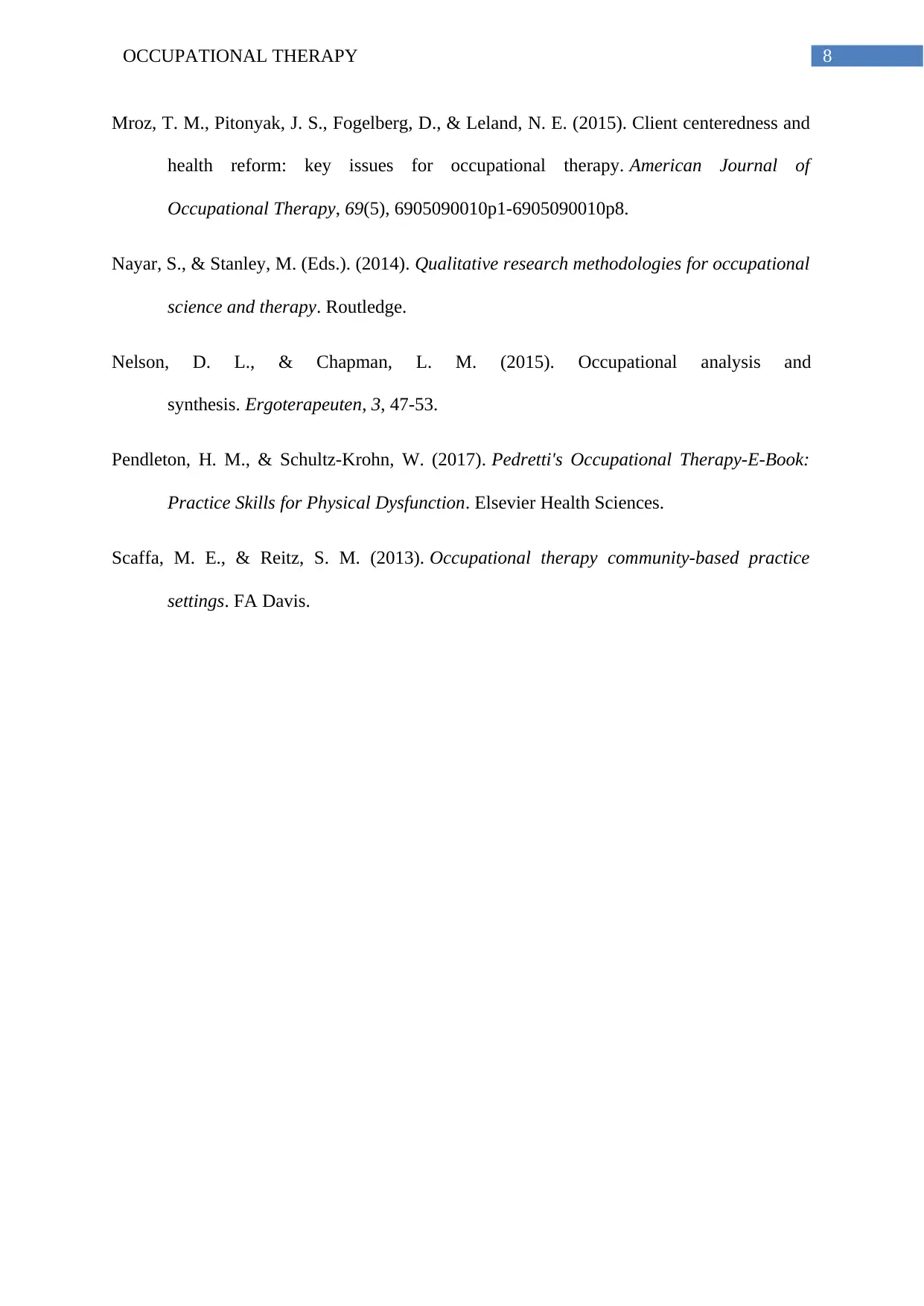
8OCCUPATIONAL THERAPY
Mroz, T. M., Pitonyak, J. S., Fogelberg, D., & Leland, N. E. (2015). Client centeredness and
health reform: key issues for occupational therapy. American Journal of
Occupational Therapy, 69(5), 6905090010p1-6905090010p8.
Nayar, S., & Stanley, M. (Eds.). (2014). Qualitative research methodologies for occupational
science and therapy. Routledge.
Nelson, D. L., & Chapman, L. M. (2015). Occupational analysis and
synthesis. Ergoterapeuten, 3, 47-53.
Pendleton, H. M., & Schultz-Krohn, W. (2017). Pedretti's Occupational Therapy-E-Book:
Practice Skills for Physical Dysfunction. Elsevier Health Sciences.
Scaffa, M. E., & Reitz, S. M. (2013). Occupational therapy community-based practice
settings. FA Davis.
Mroz, T. M., Pitonyak, J. S., Fogelberg, D., & Leland, N. E. (2015). Client centeredness and
health reform: key issues for occupational therapy. American Journal of
Occupational Therapy, 69(5), 6905090010p1-6905090010p8.
Nayar, S., & Stanley, M. (Eds.). (2014). Qualitative research methodologies for occupational
science and therapy. Routledge.
Nelson, D. L., & Chapman, L. M. (2015). Occupational analysis and
synthesis. Ergoterapeuten, 3, 47-53.
Pendleton, H. M., & Schultz-Krohn, W. (2017). Pedretti's Occupational Therapy-E-Book:
Practice Skills for Physical Dysfunction. Elsevier Health Sciences.
Scaffa, M. E., & Reitz, S. M. (2013). Occupational therapy community-based practice
settings. FA Davis.
⊘ This is a preview!⊘
Do you want full access?
Subscribe today to unlock all pages.

Trusted by 1+ million students worldwide
1 out of 9
Related Documents
Your All-in-One AI-Powered Toolkit for Academic Success.
+13062052269
info@desklib.com
Available 24*7 on WhatsApp / Email
![[object Object]](/_next/static/media/star-bottom.7253800d.svg)
Unlock your academic potential
Copyright © 2020–2026 A2Z Services. All Rights Reserved. Developed and managed by ZUCOL.





